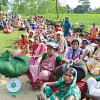The real worth of a cup of tea

Friday morning. I am trying to solve a riddle. It involves two essential items on my breakfast menu: An egg and a cup of tea. The price per egg has gone up by Tk 5-6, while the wage of the tea leaf pluckers has remained static for God knows how many years. Underneath the sunny-side-up poach, I can see the smile of the market manipulator whom I saw on TV a while back, and behind the rising fume over my tea cup, I can see the woman narrating the miseries of the workers of a tea garden. With the Tk 120 that they make a day, I calculate, they will not even get a dozen eggs. The worth of their labour for one day has dropped down to the price of eight eggs.
My calculations instantly reminded me of Syed Mujtaba Ali's short story, Pundit Moshai, which we read in school. The story recounts a brahmin pundit who once gave his student an arithmetical problem to solve: The local English laat saheb spends Tk 75 on his three-legged dog, while the teacher earns Tk 25 as salary, with which he runs a family of eight members including a few dependents. "How many legs of the dog are equal to the brahmin family?" he quizzed.
A similarly robust reality disrupts the romantic image of a tea garden that we normally associate with our favourite beverage. The fuming tea carries the mirth of an idyllic landscape of sportive rows of perfectly-trimmed dark green tea leaf bushes, guarded by interspersed tropical trees where female tea workers rhythmically tip the two leaves and a bud that has flushed out of the shoots, before placing them in the bags hanging on their backs. The picturesque tranquility of a tea estate belies the time warp of misery and deprivation, which our tea workers have been stuck in for over a century.
When tea was introduced to this land in the 19th century, tea workers were assigned as bonded labourers. Owners today have done little to improve the condition of these workers, as they need cheap labour for the industry. And it is an industry on the slide. Let's look at some figures and try to solve some other arithmetical problems.

Bangladesh is the 10th largest tea producer in the world with a three percent share of the global yield. Yet, in 2020, we ranked 61st in tea exports worth USD 4.33 million, with a 0.056 percent share of the export pie. The top three importers of our tea have been Pakistan (52.3 percent), UAE (26.6 percent) and the US (14.4 percent). In 2021, the top four tea exporters in the world were China (USD 2.1 billion, with 28.6 percent of total tea exports), Kenya (USD 1.2 billion, 16.3 percent), Sri Lanka (USD 732.4 million, 10 percent), and India (USD 687.9 million, 9.4 percent). During this time, Sri Lanka saw a decline of 44.9 percent, probably due to its overambitious shift to organic gardening, while Kenya saw a 2.6 percent decline. Among the top exporters, the fastest-growing tea exporters from 2020 to 2021 were Japan (up by 23.1 percent), Taiwan (up by 13.1 percent), Russia (up by 9.1 percent), and Germany (up by 6.3 percent).
The last piece of information suggests that modernisation and diversification of products have improved the export potential of these countries. Our local tea market, for the most part, is happy with selling low quality dust for the local market. There is no real incentive to change the tea industry. The colonial mess in which our tea industry was born is carrying on the legacy of exploiting cheap labour to provide low quality tea for 99 percent of the local market.
The condition of our tea workers can only improve once proper attention is given to the entire sector. Banglapedia tells us, "About 0.15 million people are directly employed in the tea industry. The present generation of tea garden workers comprises heirs of a workforce recruited by the planters from Chhoto Nagpur and Jharkhand and other parts of India in the middle of the 19th century. These workers have been living in the tea gardens permanently in houses specifically made for them. The tea industry of the country faces problems as some gardens become sick and their workers are 'surplus.'"

Look at the dehumanisation of the workers and how they become redundant the moment a garden becomes sick. The workers live in a ghetto close to the gardens that we frequent for our selfies, and they live entirely at the mercy of their employers. The tears behind the tea we drink every day remain unnoticed as they are not allowed to come out of their gardens.
The recent strike called by the Bangladesh Cha Sramik Union (BCSU) has brought the issue to the fore. They are demanding a minimum wage of Tk 300 a day, which is being negotiated by the labour ministry and representatives of the tea garden owners.
I give the export details to suggest that there seems to be a reluctance to produce high-end products that will entail issues of fair trade and compliance. The danger of the sudden shift to an organic plantation in Sri Lanka and the damage that it atrophied are well-known. Our main importer Pakistan has already started officially rationing their tea. The option for us then is either to slide further down the export barrel or to use this present crisis as an opportunity to restructure the sector, which will include improvement of the condition of its workers.
Tea is a sector that requires time and patience. The problem with our new entrepreneurs is that they all want instant yields, like the egg market manipulator I mentioned above. A magistrate was seen talking to the president of the egg wholesalers. He arbitrarily fixes the market price sitting in Dhaka's Karwan Bazar. The cost of an egg does not depend on the production and transport costs. The rise in fuel made the traders arbitrarily raise the price by Tk 60 per dozen. The extra money is not going to the peripheral farmers. The middlemen are milking the situation. And these middlemen use the price of the corporate brands who market their products in fancy terms, such as "rich in omega" and "organic feed" as their benchmarks. We have seen the same examples in the case of rice.
There is no control over the middlemen and brokers. And the producers in the market will soon be forced to leave their age-old professions. A farmer will become a security guard. A tea garden worker will work in a beauty parlour. And we will be all selling imported goods with no products of our own. I sip my tea, and its steamy ghost invades my brain with the fear of an unthinkable future.
Dr Shamsad Mortuza is the pro-vice chancellor of the University of Liberal Arts Bangladesh (ULAB).

 For all latest news, follow The Daily Star's Google News channel.
For all latest news, follow The Daily Star's Google News channel. 










Comments